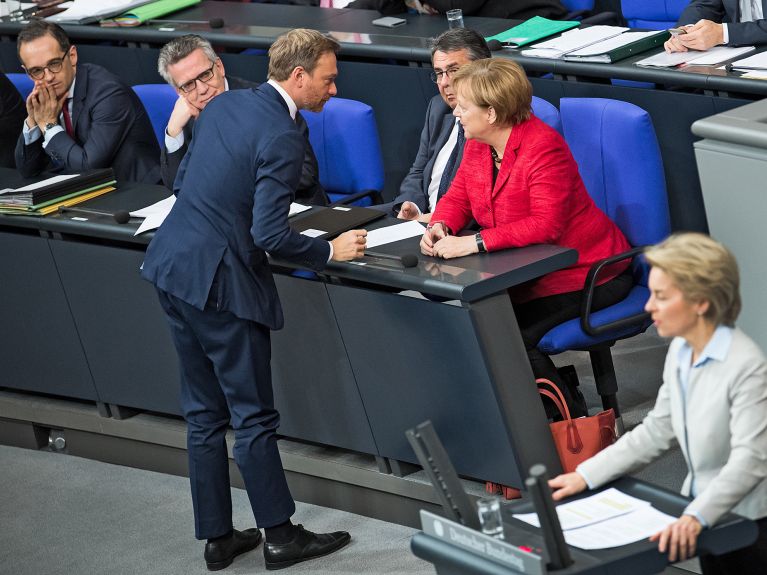“Mull it over again!”
How politicians and media are responding to the collapse of the “Jamaica” talks.

Outside Germany too there are lots of people watching what is going on in Berlin very closely. Especially in Brussels and the other European capitals, politicians and journalists are following the search for a new Federal government.
We want our most important partner to be stable and strong.
The French President Emmanuel Macron appeared worried given the collapse of the exploratory talks for a “Jamaica” coalition: “The situation becoming tense is not in our interest. For Europe we want our most important partner to be stable and strong, so that we can move forward together.”
President of the European Commission Jean-Claude Juncker was optimistic: “We are confident that the constitutional process in Germany will ensure the basis for stability and continuity,” he said in a statement.
The Netherlands have experience with tedious coalition negotiations. Foreign Minister Halbe Ziljstra was correspondingly perplexed by the fact that the talks had been broken off after, in his opinion, such a short time: “In the Netherlands it took us seven months to form a government. I would say this: Mull it over again and perhaps start talking again.” The collapse of the talks was “bad news for Europe”, he added. Ziljstra advised against fresh elections, saying that was the least favourable scenario.
The Belgians are just as experienced in difficult government-forming processes. Foreign Minister Didier Reynders’ response to the news from Germany was correspondingly relaxed. “Perhaps it’s a new tradition in lots of countries.”
Germany is a stable country with built-in constitutional safeguards that derive from the determination to avoid [the] instabilities [of the past].
International media are also addressing the collapse of the exploratory talks. The French newspaper “Le Monde” writes: “The crisis has arrived just when the European project was getting some colour back, after ten years of all but crisis management. Germany is not only the EU’s biggest economy; it is also its pole of stability and a pivotal partner for France with regard to the European project as a whole. Those with political responsibility need to be aware of that.”
“The New York Times” is concerned with the possible effects on the EU: “The [potential for] instability in Germany would be a major blow to the European Union. Ms. Merkel has been the region’s dominant political player for the past decade, credited with guiding the bloc through the aftermath of the 2008 financial crisis and, more recently, providing a powerful counterpoint to populists across the Continent and beyond.”
In Great Britain “The Guardian” expresses great faith in the German political system, but nonetheless sees exceptional circumstances: “Germany is a stable country with built-in constitutional safeguards that derive from the determination to avoid the instabilities of the past. In Britain the failure of talks would create a frantic domestic political crisis that would have to be solved by next weekend at the latest. Germany has weeks and months to sort out whether it can form a government - but is in a political territory without maps.”
